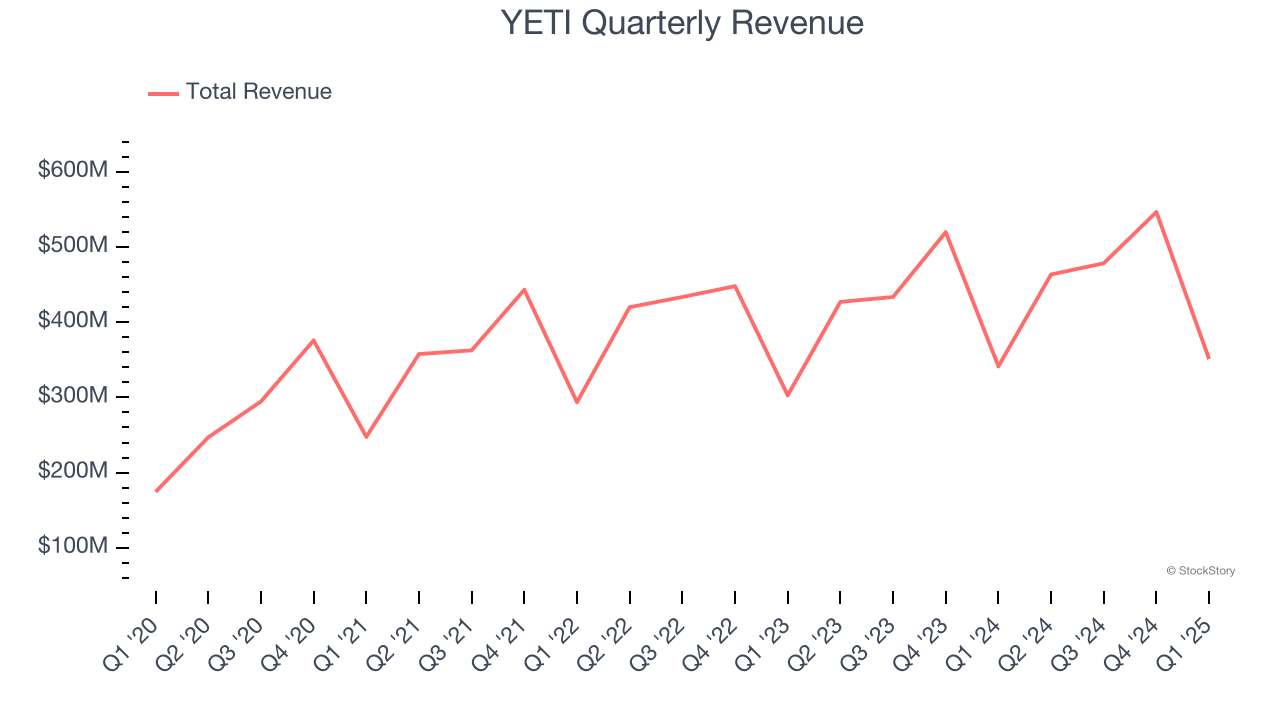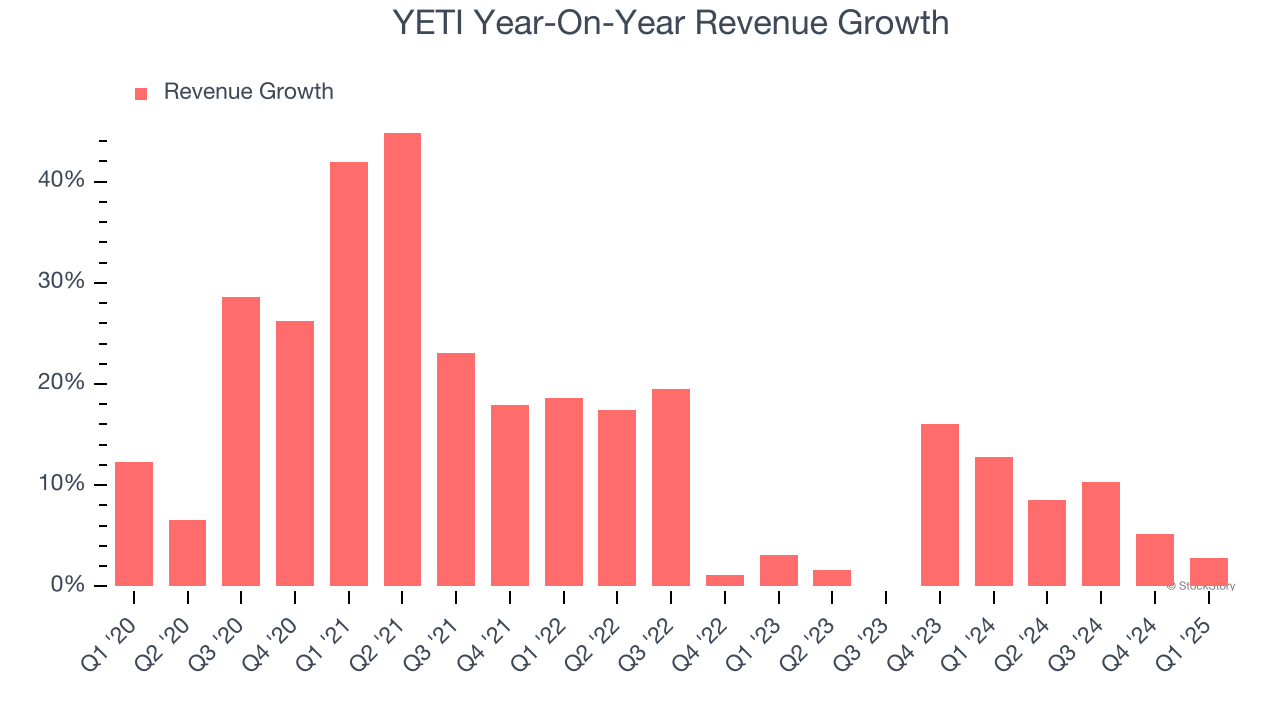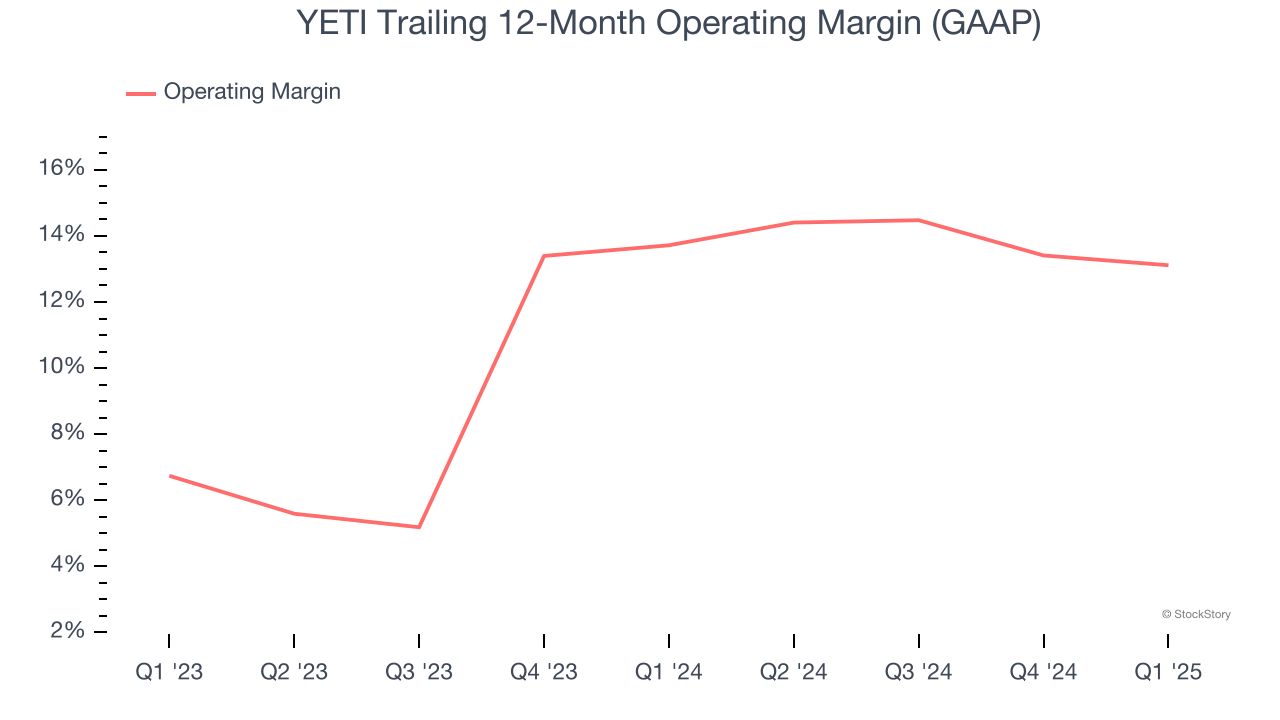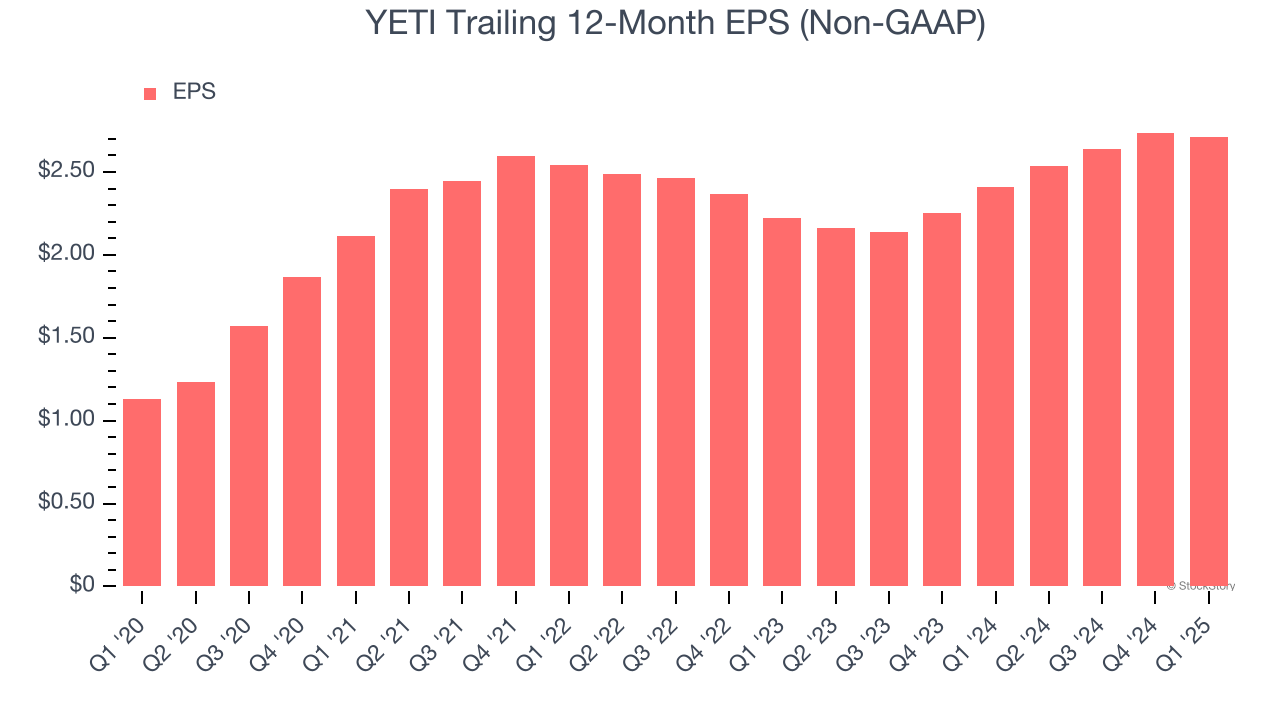
Outdoor lifestyle products brand (NYSE: YETI) beat Wall Street’s revenue expectations in Q1 CY2025, with sales up 2.9% year on year to $351.1 million. Its non-GAAP profit of $0.31 per share was 15.2% above analysts’ consensus estimates.
Is now the time to buy YETI? Find out by accessing our full research report, it’s free.
YETI (YETI) Q1 CY2025 Highlights:
- Revenue: $351.1 million vs analyst estimates of $345.8 million (2.9% year-on-year growth, 1.5% beat)
- Adjusted EPS: $0.31 vs analyst estimates of $0.27 (15.2% beat)
- Adjusted EBITDA: $44.97 million vs analyst estimates of $42 million (12.8% margin, 7.1% beat)
- Management lowered its full-year Adjusted EPS guidance to $1.99 at the midpoint, a 32% decrease
- Operating Margin: 6.2%, down from 7.6% in the same quarter last year
- Free Cash Flow was -$89.2 million compared to -$114.3 million in the same quarter last year
- Market Capitalization: $2.31 billion
Matt Reintjes, President and Chief Executive Officer, commented, “A strong start to 2025 showcased our growing global brand and broadening product portfolio alongside the operational execution that has been a hallmark of YETI. We exited the first quarter on our full year plan before the significant tariff disruption announced in April. As we now look at the changing macro and consumer environment, we remain confident that our durable balance sheet and strong gross and operating margins will allow us to continue to drive innovation, supply chain transformation and global expansion during this time.”
Company Overview
Founded by two brothers from Texas, YETI (NYSE: YETI) specializes in durable outdoor goods including coolers, drinkware, and other gear tailored to adventure enthusiasts.
Sales Growth
Reviewing a company’s long-term sales performance reveals insights into its quality. Any business can put up a good quarter or two, but many enduring ones grow for years. Over the last five years, YETI grew its sales at a 14.5% annual rate. Although this growth is acceptable on an absolute basis, it fell short of our standards for the consumer discretionary sector, which enjoys a number of secular tailwinds.

We at StockStory place the most emphasis on long-term growth, but within consumer discretionary, a stretched historical view may miss a company riding a successful new product or trend. YETI’s recent performance shows its demand has slowed as its annualized revenue growth of 7.1% over the last two years was below its five-year trend. 
We can dig further into the company’s revenue dynamics by analyzing its most important segments, Retail and Wholesale, which are 55.9% and 44.1% of revenue. Over the last two years, YETI’s Retail revenue (direct sales to customers) averaged 4.5% year-on-year growth while its Wholesale revenue (sales to retailers) was flat.
This quarter, YETI reported modest year-on-year revenue growth of 2.9% but beat Wall Street’s estimates by 1.5%.
Looking ahead, sell-side analysts expect revenue to grow 6.7% over the next 12 months, similar to its two-year rate. This projection is underwhelming and suggests its newer products and services will not accelerate its top-line performance yet.
Today’s young investors won’t have read the timeless lessons in Gorilla Game: Picking Winners In High Technology because it was written more than 20 years ago when Microsoft and Apple were first establishing their supremacy. But if we apply the same principles, then enterprise software stocks leveraging their own generative AI capabilities may well be the Gorillas of the future. So, in that spirit, we are excited to present our Special Free Report on a profitable, fast-growing enterprise software stock that is already riding the automation wave and looking to catch the generative AI next.
Operating Margin
YETI’s operating margin might fluctuated slightly over the last 12 months but has generally stayed the same, averaging 13.4% over the last two years. This profitability was solid for a consumer discretionary business and shows it’s an efficient company that manages its expenses well.

In Q1, YETI generated an operating profit margin of 6.2%, down 1.4 percentage points year on year. This reduction is quite minuscule and indicates the company’s overall cost structure has been relatively stable.
Earnings Per Share
We track the long-term change in earnings per share (EPS) for the same reason as long-term revenue growth. Compared to revenue, however, EPS highlights whether a company’s growth is profitable.
YETI’s EPS grew at a remarkable 19.2% compounded annual growth rate over the last five years, higher than its 14.5% annualized revenue growth. However, this alone doesn’t tell us much about its business quality because its operating margin didn’t expand.

In Q1, YETI reported EPS at $0.31, down from $0.34 in the same quarter last year. Despite falling year on year, this print easily cleared analysts’ estimates. Over the next 12 months, Wall Street expects YETI’s full-year EPS of $2.71 to stay about the same.
Key Takeaways from YETI’s Q1 Results
We enjoyed seeing YETI beat analysts’ EPS expectations this quarter. We were also happy its EBITDA outperformed Wall Street’s estimates. On the other hand, its full-year EPS guidance missed significantly. Overall, this quarter could have been better. The stock traded down 6.7% to $26.09 immediately following the results.
YETI’s earnings report left more to be desired. Let’s look forward to see if this quarter has created an opportunity to buy the stock. What happened in the latest quarter matters, but not as much as longer-term business quality and valuation, when deciding whether to invest in this stock. We cover that in our actionable full research report which you can read here, it’s free.






